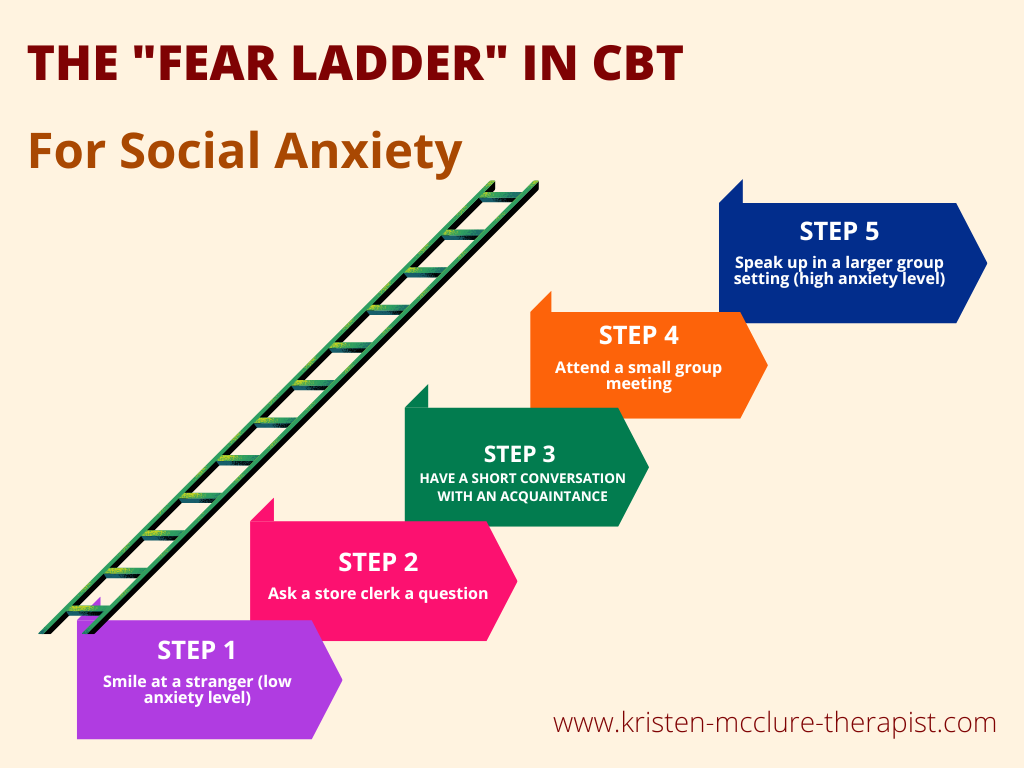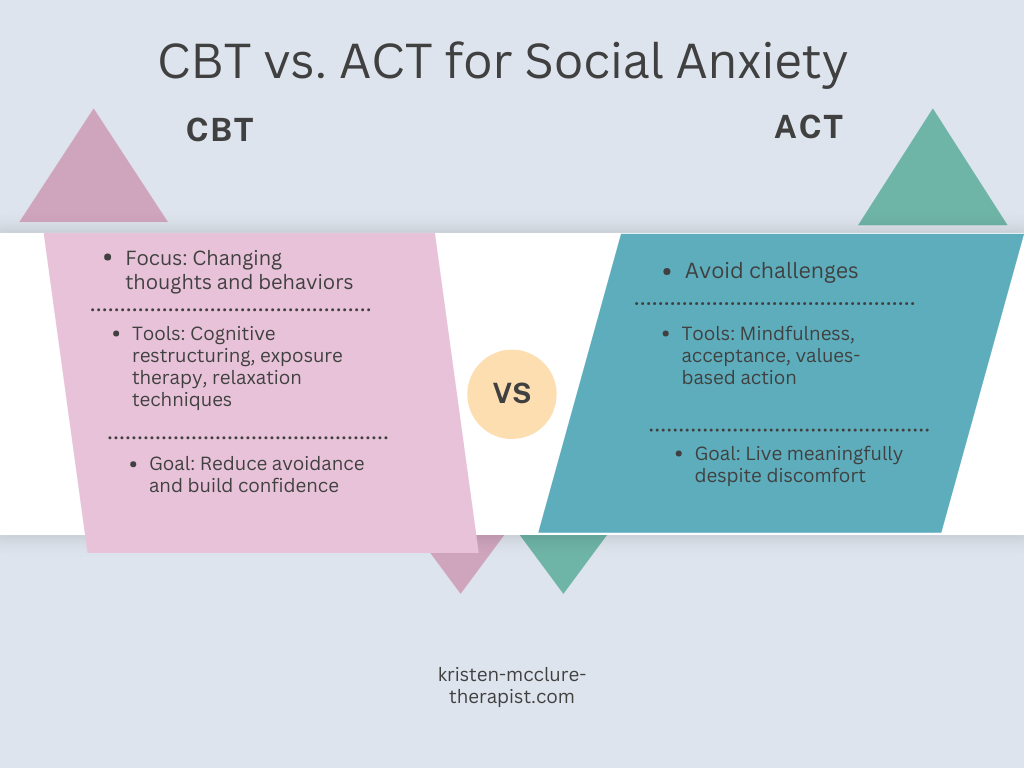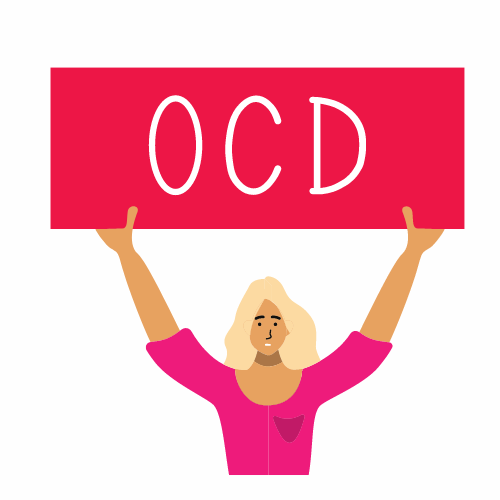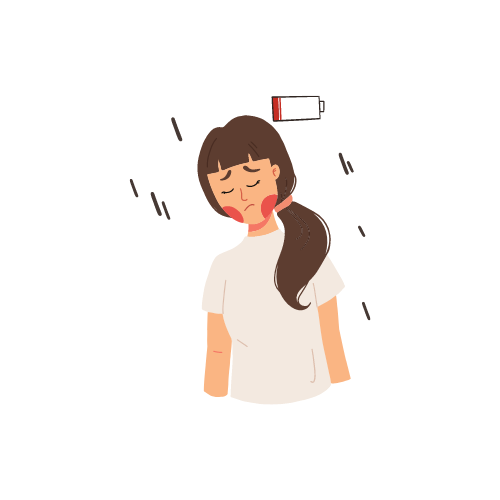Social Anxiety Therapy
What Kind of Therapy Works Best for Social Anxiety Disorder?
Social anxiety disorder is a serious condition that can profoundly impact your life, affecting relationships, work, and personal confidence. Often dismissed as shyness, introversion, or "being difficult," social anxiety is much more than that. Untreated, it can lead to significant limitations, including avoiding social interactions entirely. Therapy, especially neurodivergent-affirming approaches, can be life-changing for managing social anxiety.
Do You Need Therapy for Social Anxiety Disorder?
If social anxiety prevents you from engaging in daily activities or achieving personal goals, therapy could be a valuable step. Consider seeking help if you:
- Avoid social situations entirely.
- Struggle with professional, romantic, or family relationships.
- Experience fear so intense it affects your ability to leave the house.
Types of Therapy for Social Anxiety Disorder
1. Cognitive Behavioral Therapy (CBT)
CBT is the most researched and effective treatment for social anxiety disorder. It focuses on identifying and changing unhelpful thoughts and behaviors that fuel anxiety.
Key Components of CBT:
- Cognitive Restructuring: Learn to challenge irrational fears and replace them with realistic thoughts.
- Exposure Therapy: Gradually face feared situations using a "fear ladder," starting with less intimidating scenarios and progressing to more challenging ones.

- Relaxation Techniques: Develop tools like deep breathing or progressive muscle relaxation to manage symptoms.
With weekly sessions over 2-3 months, CBT has a success rate of 50-75% for treating social anxiety disorder. If your therapist isn’t using CBT, consider asking why, as it remains the gold standard.
2. Acceptance and Commitment Therapy (ACT)
ACT focuses on accepting your thoughts and emotions rather than trying to control or avoid them. This therapy is highly effective for individuals who find it difficult to manage or suppress anxious thoughts.
Key Components of ACT:
- Mindfulness: Build awareness of thoughts and feelings without judgment.
- Acceptance: View anxiety as a natural experience rather than something to fear or suppress.
- Values-Based Action: Identify what truly matters to you and commit to actions aligned with your values, even if anxiety persists.

3. Neurodivergent-Affirming Therapy
For neurodivergent individuals, such as those with ADHD or autism, traditional therapy methods may not address unique needs like sensory sensitivities or pacing. Neurodivergent-affirming therapy provides a gentler, more personalized approach.
What Makes Neurodivergent-Affirming Therapy Different?:
- Sensory Awareness: Therapists consider sensory sensitivities that might overwhelm traditional exposure therapy.
- Flexible Pacing: Sessions are tailored to your energy levels and social comfort zones.
- Client-Driven: Therapy is guided by your feedback, ensuring it feels collaborative and affirming.
- Focus on Strengths: Emphasizes self-compassion and leveraging your unique strengths rather than framing anxiety as a “deficit.”
This approach ensures that therapy feels safe, respectful, and attuned to your needs, fostering long-term growth.
Why Avoidance Makes Anxiety Worse
Avoidance is a common coping mechanism for social anxiety but is also one of its biggest traps. While avoiding feared situations might provide temporary relief, it reinforces the belief that these situations are dangerous. Over time, this avoidance increases overall anxiety.
CBT, ACT, and neurodivergent-affirming therapy all target avoidance behaviors helping individuals gradually face their fears and build healthier responses.
What to Expect From Counseling
Therapy for social anxiety disorder is a structured yet personalized process. Here’s what you can expect:
- Initial Assessment: Your therapist evaluates your symptoms, triggers, and how anxiety impacts your daily life.
- Goal Setting: You and your therapist outline what you hope to achieve, like feeling more confident in social situations or reducing avoidance.
- Skill Building: Learn practical strategies such as cognitive restructuring, mindfulness, and relaxation techniques.
- Gradual Progress: Therapists use exposure or pacing exercises, always considering your comfort level.
- Regular Feedback: A neurodivergent-affirming therapist will regularly check in to ensure the process feels safe and effective for you.
Is Therapy Right for Me? Self-Assessment Quiz
Answer the following questions based on your experiences. Your responses will help you explore whether therapy might be beneficial for you.
FAQ: Therapy for Social Anxiety Disorder
1. How long does therapy for social anxiety disorder take?
The duration of therapy depends on your goals and the severity of your social anxiety. Many individuals see significant progress with CBT after 12–16 weekly sessions. However, therapy is a personal journey, and some people may benefit from ongoing support.
2. What’s the difference between ACT and CBT for social anxiety?
- CBT focuses on identifying and changing negative thoughts and behaviors that contribute to anxiety. It’s structured and often includes exposure exercises.
- ACT emphasizes accepting anxious thoughts and feelings without judgment while committing to actions aligned with your values. It’s more about living meaningfully despite discomfort.
3. What is neurodivergent-affirming therapy, and who is it for?
Neurodivergent-affirming therapy tailors traditional approaches like CBT and ACT to honor the needs of individuals with ADHD, autism, or other neurodivergent traits. It’s especially beneficial if you experience sensory sensitivities, need flexible pacing, or value a collaborative, strengths-focused approach.
4. Can social anxiety be cured?
While social anxiety may not “go away” entirely, therapy can help you manage symptoms effectively, reduce avoidance behaviors, and build confidence. Many individuals learn to navigate social situations with greater ease and self-assurance.
5. What should I do if therapy doesn’t seem to work?
If a particular approach doesn’t feel effective, discuss this with your therapist. They can adjust strategies, recommend alternative methods, or refer you to another professional. Therapy is a partnership, and your feedback is essential.
Closing Encouragement
Social anxiety can feel isolating, but seeking therapy is a powerful first step. Whether you choose CBT, ACT, or neurodivergent-affirming therapy, the process is about empowering you to build a life that feels aligned with your values and strengths. You don’t have to face this alone—support is available, and your growth is possible.
Outside Links





